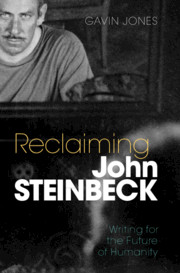Book contents
- Reclaiming John Steinbeck
- Reclaiming John Steinbeck
- Copyright page
- Dedication
- Contents
- Figures
- Acknowledgments
- Introduction Loving and Hating Steinbeck
- Chapter 1 Short Stories in School and Lab: “Tularecito” and “The Snake”
- Chapter 2 Drought, Climate, and Race in the West: To a God Unknown
- Chapter 3 Race and Revision: “The Vigilante” and “Johnny Bear”
- Chapter 4 Becoming Animal: Theories of Mind in The Red Pony
- Chapter 5 What Is It Like to Be a Plant? “The Chrysanthemums” and “The White Quail”
- Chapter 6 On Not Being a Modernist: Disability and Performance in Of Mice and Men
- Chapter 7 Emergence and Failure: The Middleness of The Grapes of Wrath
- Chapter 8 Borderlands: Extinction and the New World Outlook in Sea of Cortez
- Chapter 9 Mexican Revolutions: The Forgotten Village, The Pearl, and the Global South
- Epilogue The Aftertaste of Cannery Row
- Notes
- Index
Chapter 7 - Emergence and Failure: The Middleness of The Grapes of Wrath
Published online by Cambridge University Press: 02 July 2021
- Reclaiming John Steinbeck
- Reclaiming John Steinbeck
- Copyright page
- Dedication
- Contents
- Figures
- Acknowledgments
- Introduction Loving and Hating Steinbeck
- Chapter 1 Short Stories in School and Lab: “Tularecito” and “The Snake”
- Chapter 2 Drought, Climate, and Race in the West: To a God Unknown
- Chapter 3 Race and Revision: “The Vigilante” and “Johnny Bear”
- Chapter 4 Becoming Animal: Theories of Mind in The Red Pony
- Chapter 5 What Is It Like to Be a Plant? “The Chrysanthemums” and “The White Quail”
- Chapter 6 On Not Being a Modernist: Disability and Performance in Of Mice and Men
- Chapter 7 Emergence and Failure: The Middleness of The Grapes of Wrath
- Chapter 8 Borderlands: Extinction and the New World Outlook in Sea of Cortez
- Chapter 9 Mexican Revolutions: The Forgotten Village, The Pearl, and the Global South
- Epilogue The Aftertaste of Cannery Row
- Notes
- Index
Summary
Steinbeck’s Grapes of Wrath is a notoriously ambivalent book, seeming at once politically radical and conservative in its social vision. Rather than dismissing these contradictions, this chapter examines the work performed by literary vagueness as it relates to a crucial concept that runs through Steinbeck’s writing: the process of emergence, the formation of wholes from component parts, which we see in analyses of Steinbeck’s construction of character, his slow descriptions of people and things, and his metafictional self-consciousness of the act of writing. Turning to the social philosophy of the novel, the chapter relates its faltering quality of thought--its failed attempt to articulate its ideas--to a developing understanding of the public sphere defined by false opinions and vulnerable to propaganda. The novel’s vagueness, in which ideas are always emerging but never fully forming, explains the book’s appeal to different political viewpoints. The novel’s partial self-understanding also explains Steinbeck’s failure to imagine nonwhite laborers in the California fields, as well as the jarring quality of the book’s final scene, whose power to imagine a public relationship between strangers depends on its provocative incompletion.
- Type
- Chapter
- Information
- Reclaiming John SteinbeckWriting for the Future of Humanity, pp. 129 - 146Publisher: Cambridge University PressPrint publication year: 2021

